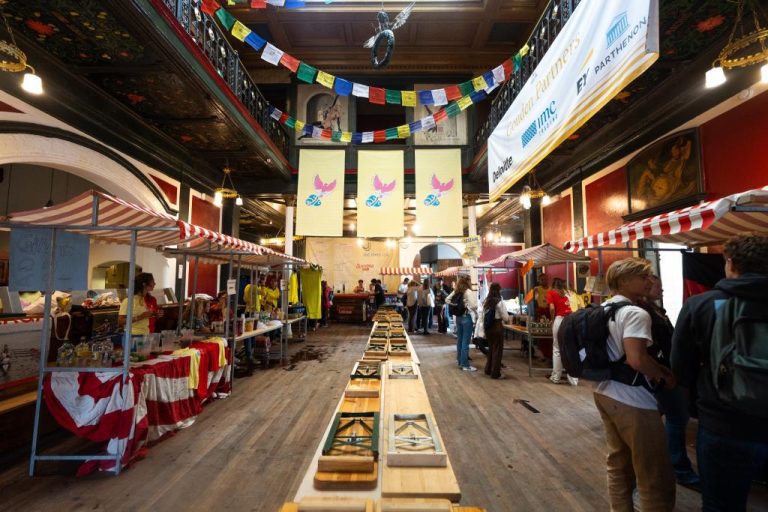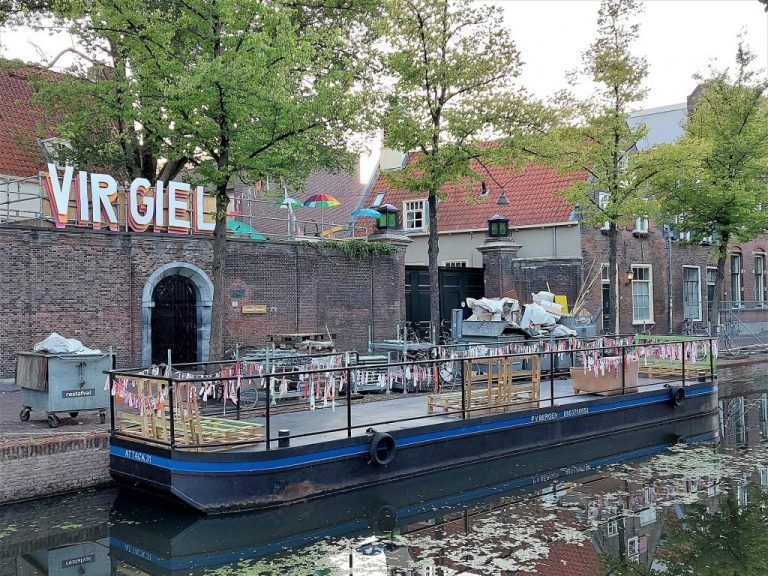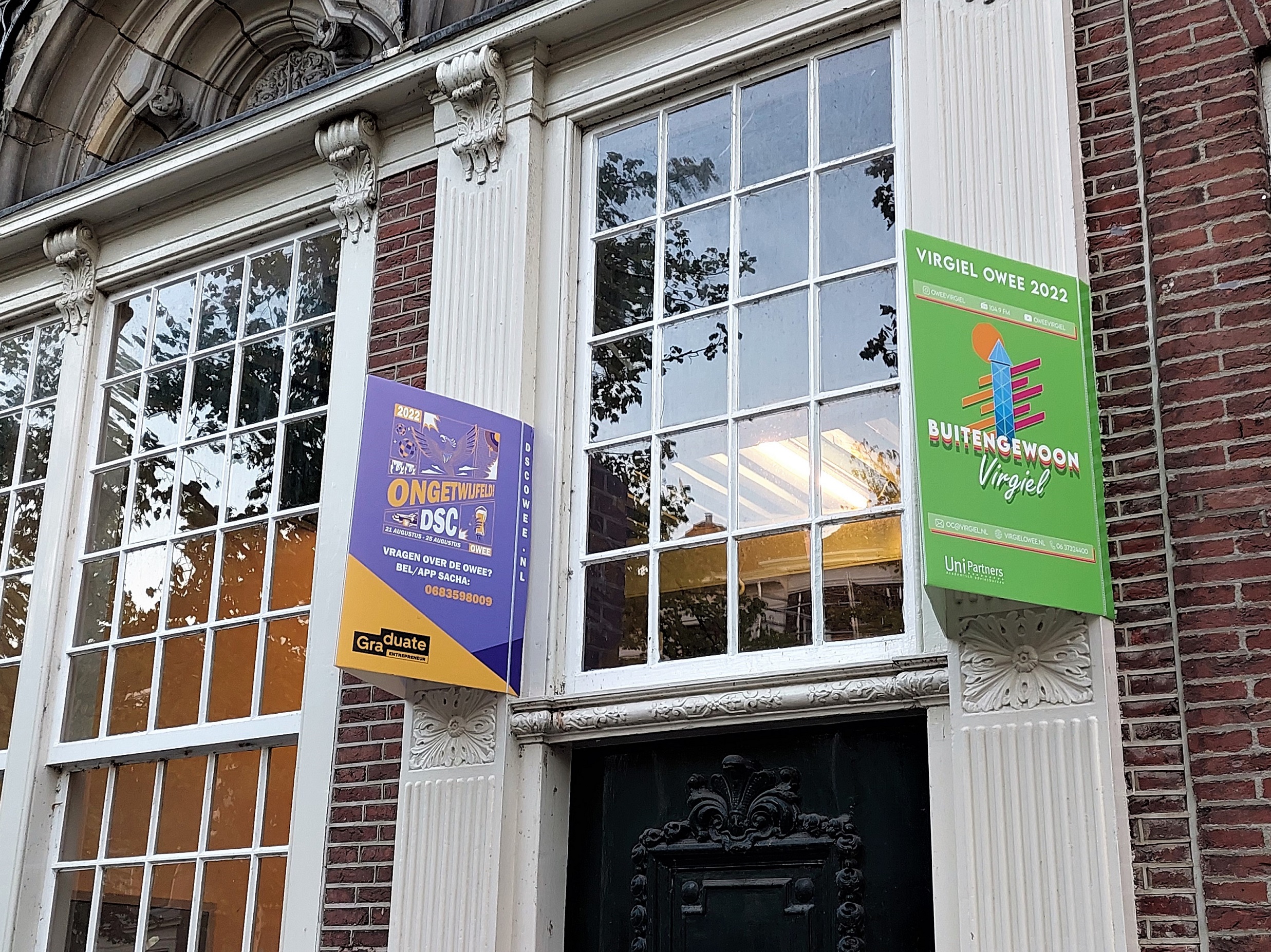DSC and Virgiel have been issued official warnings by TU Delft. The Executive Board is particularly concerned about DSC: “The culture of the initiation period is not right.”
(Photo: Marjolein van der Veldt)
This story in short:
- According to TU Delft, during the initiation period of 2021 at DSC, first years were covered in candle wax and their ‘hair caught fire’ while the mentors were drunk.
- At Virgiel, a group of four or five members abused a fellow student. He ended up naked on glass on the floor and nobody intervened.
- Both these student associations have been issued an official warning with a trial period of three years.
- Extra sanctions have also been imposed on DSC.
- TU Delft’s Executive Board says that it does not yet have the confidence that the forthcoming initiation period at DSC will proceed without incident.
- DSC can still not place the allegation and finds it ‘a pity’ that TU Delft still has no confidence in the steps it has taken. “We have introduced a lot of changes […] to ensure social safety.”
- Virgiel says that it understands why it was subject to the sanctions, and that it itself has imposed sanctions internally. Chair Lucas Honée says that he is shocked by this ‘deplorable incident’.
TU Delft’s Executive Board investigated reports and complaints about both student associations last year. Now, just before the OWee initiation week starts, it made its decisons about the sanctions known.
Both student associations have been issued an official warning with a trial period of three years. In that period, should there be any more incidents, TU Delft can revoke its official recognition of the student associations and limit its financing for a few months. Furthermore, during the OWee and the initiation period, both student associations must ‘prioritise the inclusion and social safety of its members’.
On top of this, the Delftsch Studenten Corps may not attend TU Delft’s opening of the academic year and the Dies Natalis. The Executive Board also requests DSC to ‘take extra measures to ensure the physical safety of members and prospective members’ during the initiation period.
This is recorded in two Executive Board resolutions. The one about the DSC is especially critical in it’s tone. The Executive Board notes that the association has done too little in recent years to change the ‘culture of social insecurity’ despite a sanction imposed in 2018 (in Dutch). It writes that ‘In the opinion of TU Delft, the culture of the initiation period is not right’. According to the Executive Board, the same applies to the ‘values in the association and the way members address each other’.
The Executive Board has received cooperation from both student association boards during the investigation, it writes. Nevertheless, the Executive Board also notes that there is ‘reluctance on their part towards the association as a whole to take a firm stand and document it’. The Executive Board believes that DSC lacks the ‘ability for introspection’, faces shortcomings in its abilities to control situations, and that the mentors drink too heavily during the initiation period.
DSC: hair on fire
As mentioned above, the Executive Board has carried out an investigation into both student associations. In the case of DSC the reason was an anonymous complaint about the 2021 initiation exacerbated by ‘reports of incidents during the initiation period’. The latter are not further described.

DSC at the OWee 2021. (Photo: Daniël Korvemaker)
The first complaint emerged last year in the De Volkskrant newspaper. A TU Delft student spoke of an incident in which candle wax was poured over prospective members and someone’s hair caught fire. In its resolution, the Executive Board summarises the events as ‘dripping candles, drunk mentors, hair on fire, and injuries’.
In January 2022, the Executive Board asked DSC for points of improvement for the forthcoming initiation period. DSC shared these the very same month.
- One person at DSC will appointed specially to be responsible for the safety policy.
- A mandatory internal meeting will be held to discuss the code of conduct during the initiation period in regard to the use of alchohol and the avoidance of physical contact.
- It will be made clear that prospective members can always step out of activities anytime during the initiation period.
- A new group of eight members will enforce the rights of the first years.
- There must always be at least eight sober people in attendance.
- The first years may not sleep in student houses.
- TU Delft will co-examine the initiation period programme in detail before the summer.
- DSC will ‘report any incidents to TU Delft with complete transparency’.
The Executive Board does not consider these measures sufficient, it writes in its resolution. It does not see a clear description ‘of what is and is not permitted in terms of physical integrity’ on DSC’s website. It also believes that the mentors should drink less alcohol, and DSC should permit external enforcement that may intervene if necessary. The Executive Board thus explicitly requests the association to take extra measures.
Both DSC and a TU Delft spokesperson confirm that a first meeting was held on this issue on 17 August and a second will be held before the initiation period. According to the spokesperson, ‘the sanction has put greater pressure on the association, because of which more visible action has been taken’. ‘Both the Board and the committee that organises the initiation period are fully aware of the requirements. Everything depends on the behaviour of the members during the initiation period, so assessing whether the requirements are enough will only transpire afterwards.’
DSC’s response: ‘We really have changed a lot’
In line with its response in September 2021, DSC said that ‘it could not place’ the incident about which an anonymous complaint was submitted. ‘We requested TU Delft to share more details about the anonymous complaint and the incident that it describes. Up to now we have not received any details, and even after a thorough internal investigation, we cannot place the incident. We take every complaint and report very seriously,’ writes President Olivier Abbenhuis in response to our questions.
The other reports about which the Executive Board write are ‘not serious incidents’, says Abbenhuis. ‘Nevertheless, we attach importance to practicing openness, even if it concerns minor cases such as twisting an ankel after stumbling.’
The President says that it is ‘a pity that we were not able to convince TU Delft of our explicit goal to make the forthcoming initiation period as safe and responsible as possible, putting the psychological and physical welfare of the members and prospective members first. We devote much attention to explaining the behavioural norms and rules to both members and prospective members, and we believe that we have a comprehensive system in place to keep check, enforce the rules, and that we can investigate and punish violations.’ Abbenhuis also points out that in the forthcoming initiation period there will be more sober people to keep order. ‘The alcohol will also be strictly controlled and drunk people will be removed from the programme.’
Abbenhuis writes that he understands the critical view of the Executive Board. ‘But we are disappointed that we are being accused of being highly abstract, while for the initiation period of 2022 we have explicity introduced very practical changes. These include new external enforcement bodies, new programme components, and cetralising the overnight stays of prospective members in sports halls.’ In terms of external enforcement, he goes into more detail. This body will be set up jointly with Virgiel and will involve former members of both student associations going back and forth carrying out checks. If they see anything untoward, they may stop the programme.
‘Humour is fundamental to the initiation period’
Abbenhuis says that ‘afety and health are number one during and outside the initiation period. We will not hesitate to enforce this. It now depends on the effectiveness of the proposed measures and retaining the character of the initiation period that facilitates getting to know each other, making friends and learning norms and values in a short period.’
He adds that sleeping in student houses had already been stopped. ‘Not because many incidents happened regularly in student houses, but because we cannot permanently check so many houses and could not check the well-being of all the prospective members ourselves.’
In contrast to what the Executive Board says, he says that ‘any changes have already been introduced to ensure the social safety of activities at the Delftsch Studenten Corps. In consultation with the district police officers, psychologists and TU Delft, we have taken giant steps to make well-being and safety open for discussion, to have more points of contact, and made the reporting of violations easier.’
Abbenhuis calls the initiation period ‘a two-week trial where humour is fundamental’. He believes that his student association will do everything it can to prevent ‘boundaries being crossed’. He says that every programme component has been ‘carefully thought through’ and safety and health prioritised. He calls on the members not to show or accept any improper behaviour and if it does happen, to address each other on it. ‘At all times, not only during the initiation period, it is about us actively working on creating a safe environment where everyone feels welcome.’ He asks prospective members ‘to always make it clear if a boundary has been reached. Every undertaking will be stopped immediately if it is clear that enough is enough.’
Virgiel: clothes torn off the body
The Executive Board received a report of an incident that occurred within the ‘vertikale’ (literally vertical) Melkbus (a vertikale is a sub group within the student association, Virgiel in this case, with members of different years, Eds.). Later, a report was received about the obligatory consumption of alcohol.

Ahead of the OWee 2022, a café boat appeared at Virgiel. (Photo: Marjolein van der Veldt)
The first incident is described in the resolution by the Executive Board. It is about an unannounced gathering of Melkbus at the Virgiel club building for what the members called ‘rugby drinks’. According to Virgiel, it is usual practice during these kinds of drinks that the members ‘push their way to their regular place’. This is not supposed to go beyond a bit of pushing and pulling of jackets and shirts.
On 12 May 2022, it went further. Someone standing in a quiet spot was dragged into the room against his will by four or five Melkbus members. They took away his valuables, tore his clothes off leaving him naked, and pushed him against a wall so hard that he banged his head and fell onto a floor covered in glass. This happened when the club building was full, yet nobody intervened. The Executive Board expresses its disbelief in its resolution: ‘It is incomprehensible that there was no intervention during this incident.’
It is unclear to the Executive Board how this incident could occur, why the members did not address each other, and who was responsible for it. The Executive Board believes that it is because the members of the Melkbus ‘protect each other’. It writes that ‘in terms of changing the culture, there is much work to be done’, also in terms of ‘instigating the obligatory consumption of alcohol’.
According to the Executive Board, Virgiel needs to work on its ‘addressing culture’ and sort out its social values. However, the Executive Board does see that Virgiel was ‘open in its communications about the incident’, has promised to ‘take steps’, shows understanding, and has imposed internal sanctions.
Virgiel’s response: ‘This is not our culture’
Virgiel Chair Lucas Honée says that he is shocked by this ‘deplorable incident’. “We understand why TU Delft has imposed sanctions on us. The trial period is a stimulus for us. We hope that this does not happen again and we are working on it.”
Honée explains that he received the report from the lawyer of the victim, who later reported it to the Executive Board. “As the victim wished to remain anonymous, we spoke to his lawyer. We wanted to know how he was and what we needed to do to have him come back to the club building. He has now come back luckily. He feels welcome there. Even though it was busy when the incident happened, hardly anyone knows that he was the victim.”
For this reason, Honée would rather not say which vertikale the victim belongs to. This is important because this vertikale was also given a warning, in this case for the forced drinking of alcohol the previous academic year, which the victim also reported. “I am pleased that this was reported too,” says Honée. “Then we can do something about it. I want to encourage more people to lodge reports.”
Within Virgiel, vertikale Melkbus has been suspended from this OWee and initiation period. “See it as a ban on gathering together. They may not attend as a group,” explains Honée. He says that Melkbus as a whole needed to be punished as not all the perpetrators reported themselves. One perpetrator, the one that pushed the victim, may not enter the club building during the OWee and part of the initiation period. Two others, including one person who took photos using the victim’s phone, were not allowed to be there until the OWee started.
‘We have fallen short as a Board’
Honée thinks these are appropriate sanctions that hit the perpetrators where it hurts. “The Executive Board wanted us to suspend the Melkbus, but this would not stop them from gathering. We believe that our sanctions work better.”
Honée has thought hard about the incident and his student association, he says. “The Board struggled with it at first as it seemed as though the members did not know what the norms were anymore after Covid. This was also an issue in this case. It is only regrettable that this happened in a vertikale, a club that also has older members. They should show the younger members how things work, like big brothers. This system has totally failed.”
His words show that he does not intend to shy away from his responsibility as a board member. “I repeatedly ask myself why nobody intervened. We have fallen short as a Board. We were in the building when it happened. That we were not in the room itself is no excuse. We were there, but we did not see it happen.”
What is Honée doing to make sure that this does not happen again at Virgiel? The Chair names the following measures.
- The household regulations in terms of pushing each other (so called brassen) have been changed.
- An email will be sent to all members before the initiation period about transgressive behaviour which will call on members to think about the norms and values that members of Virgiel should uphold.
- Amnesty International will give a workshop during the initiation period about appropriate behaviour.
- The internal confidential advisors will be promoted more.
- A representative of the first years and Honée’s successor will sign an agreement about appropriate behaviour.
- New members will sign a ‘social contract’ about dealing with the citizens of Delft and with each other.
According to Honée, the culture of obligatory alcohol consumption disappeared years ago. “Everyone knows that this really is unacceptable, and this is also included in a contract that all vertikale board members sign. Under the terms of the contract, they are held personally liable for malpractices. It goes without saying that we deal with incidents firmly. We also have an alcohol-free 0.0 beer tap and everyone thinks that drinking 0.0 is normal. There is often also water available at the bar.”
The Chair hopes that it is clear to the new students and their parents that Virgiel has their best interests at heart. “The line between student behaviour and transgressive behaviour is thin for some people. But we will not accept the latter. Transgressive behaviour is not our culture.”
Do you have a question or comment about this article?
s.m.bonger@tudelft.nl


Comments are closed.